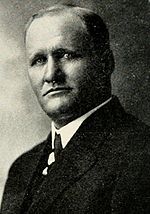Benjamin Baker Moeur, Date of Birth, Place of Birth, Date of Death
TweetBenjamin Baker Moeur
American politician
 Date of Birth: 22-Dec-1869
Date of Birth: 22-Dec-1869
 Place of Birth: Tennessee, United States
Place of Birth: Tennessee, United States
Date of Death: 16-Mar-1937
Profession: politician
Nationality: United States
Zodiac Sign: Capricorn 
About Benjamin Baker Moeur
- Benjamin Baker Moeur (December 22, 1869 – March 16, 1937) was the fourth governor of Arizona, one of the United States of America. Born in Decherd, Tennessee, Mouer was a medical doctor before running for public office.
- He is credited with having delivered most of the babies born in Tempe for 36 years. His pre-gubernatorial positions included service as the Secretary of the Board of Education for Arizona State Teacher's College (the precursor to Arizona State University) in Tempe. During Moeur's governorship, he mobilized the Arizona National Guard to stop the construction on Parker Dam, which was being built primarily to divert more water to the Los Angeles area.
- The mobilization was partly an embarrassment, as the troops arrived via an antiquated steamboat, which became stranded.
- Its troops were rescued by workers from California working at the dam.
- Mouer's primary motive, however, was later vindicated by the United States Supreme Court when it ruled that California and the Bureau of Reclamation were constructing Parker Dam illegally because the dam had never been properly authorized.
- Subsequent legislation rectified this error and construction continued apace. Moeur left office in 1937 and died 71 days later in Tempe, where he is buried at the Double Butte Cemetery. In 1939, as a WPA project, Tempe Normal School (later known as Arizona State University) constructed the B.
- B.
- Moeur Activity Building on the main Tempe campus.
- The building was originally the women's activity center, later being remodeled and used as the university's admissions office.
- The building now houses the Mars Space Flight Facility, a NASA-funded research center directed by Dr.
- Phil Christensen. Dr.
- Moeur has been honored since 1901 by the now Arizona State University via the Moeur Award.
- The Moeur Award is given to the student or students with the highest academic standing in terms of GPA, and is thus also considered the equivalent to a Valedictorian Award (which is not directly offered by Arizona State).
Read more at Wikipedia

